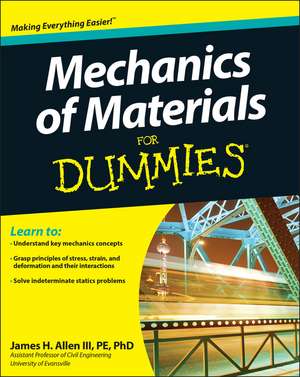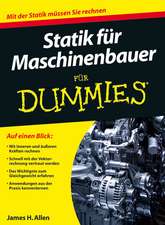Mechanics of Materials for Dummies
Autor JH Allenen Limba Engleză Paperback – 7 iul 2011
Preț: 122.39 lei
Nou
Puncte Express: 184
Preț estimativ în valută:
23.42€ • 24.45$ • 19.34£
23.42€ • 24.45$ • 19.34£
Carte disponibilă
Livrare economică 25 martie-08 aprilie
Livrare express 11-15 martie pentru 33.33 lei
Preluare comenzi: 021 569.72.76
Specificații
ISBN-13: 9780470942734
ISBN-10: 0470942738
Pagini: 384
Ilustrații: Illustrations
Dimensiuni: 187 x 235 x 21 mm
Greutate: 0.57 kg
Ediția:New.
Editura: Wiley
Locul publicării:Hoboken, United States
ISBN-10: 0470942738
Pagini: 384
Ilustrații: Illustrations
Dimensiuni: 187 x 235 x 21 mm
Greutate: 0.57 kg
Ediția:New.
Editura: Wiley
Locul publicării:Hoboken, United States
Public țintă
Mechanics of Materials For Dummies appeals to the large percentage of college and graduate school students majoring in the engineering field (7th most popular degree nationally). This book tracks to a course that is a prerequisite for most engineering degrees.Cuprins
Introduction. Part I: Setting the Stage for Mechanics of Materials. Chapter 1: Predicting Behavior with Mechanics of Materials. Chapter 2: Reviewing Mathematics and Units Used in Mechanics of Materials. Chapter 3: Brushing Up on Statics Basics. Chapter 4: Calculating Properties of Geometric Areas. Chapter 5: Computing Moments of Area and Other Inertia Calculations. Part II: Analyzing Stress. Chapter 6: Remain Calm, It's Only Stress! Chapter 7: More than Meets the Eye: Transforming Stresses. Chapter 8: Lining Up Stress Along Axial Axes. Chapter 9: Bending Stress Is Only Normal: Analyzing Bending Members. Chapter 10: Shear Madness: Surveying Shear Stress. Chapter 11: Twisting the Night Away with Torsion. Part III: Investigating Strain. Chapter 12: Don't Strain Yourself: Exploring Strain and Deformation. Chapter 13: Applying Transformation Concepts to Strain. Chapter 14: Correlating Stresses and Strains to Understand Deformation. Part IV: Applying Stress and Strain. Chapter 15: Calculating Combined Stresses. Chapter 16: When Push Comes to Shove: Dealing with Deformations. Chapter 17: Showing Determination When Dealing with Indeterminate Structures. Chapter 18: Buckling Up for Compression Members. Chapter 19: Designing for Required Section Properties. Chapter 20: Introducing Energy Methods. Part V: The Part of Tens. Chapter 21: Ten Mechanics of Materials Pitfalls to Avoid. Chapter 22: Ten Tips to Solving Mechanics of Materials Problems. Index.






















